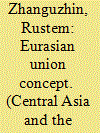| Srl | Item |
| 1 |
ID:
134131


|
|
|
|
|
| Publication |
2014.
|
| Summary/Abstract |
The author probes deep into the concept of Eurasianism, the subject of heated discussions interpreted as an integration attempt in the post-Soviet expanse. He looks at the idea of Eurasianism as a civilizational project designed to unify all entities of the geostrategic expanse into a single whole. This multilayered problem cannot be exhaustively analyzed in one or even several dozen articles. Nevertheless, the subject deserves clarification as a target of analysis.
The political and economic vs. civilizational discourse looks very much like the chicken or the egg dilemma. The author prefers a civilizational discourse, although many will probably disagree with him.
|
|
|
|
|
|
|
|
|
|
|
|
|
|
|
|
| 2 |
ID:
090422


|
|
|
|
|
| Publication |
2009.
|
| Summary/Abstract |
The article discusses the problems of the successes and the failures of Georgia's post-revolutionary economic development. Amongst the positive results, the significant increase of national budget revenues and the overcoming of the energy crises should be emphasized, both of which were achieved by the fight against domestic internal corruption. At the same time, mistakes in terms of both the building of a democratic state and economic policy were made. Making the judiciary an appendage to the General Prosecutor's Office and the executive branch, the government's control of the media and its defiance of property rights, including extra-judicial decisions to demolish privately owned residential houses, are among the most serious errors of Georgia's post-revolutionary development. Despite its anti-Russian rhetoric, the new government has openly welcomed Russian investments into Georgia's economy. After the Russian aggression and under the impact of the global financial crisis, Georgia finds itself in a more complicated situation. International financial aid of US$4.55 billion, which was pledged at the international donors' conference held in Brussels in October 2008 for the reconstruction of post-war Georgia, may enable the country to avoid the banking and currency crisis.
|
|
|
|
|
|
|
|
|
|
|
|
|
|
|
|
| 3 |
ID:
164503


|
|
|
|
|
| Summary/Abstract |
The European Union (EU) is an imperial power. Building on the EU-as-empire paradigm and Manners’ concept of ‘normative power’, this article argues that owing to the institutional set-up of its governance and its discursive strategies, the Union resembles an imperial polity which has to adopt an interest- and norm-driven ‘dual strategy’. EU scholarship has been exploring the tensions between short-term security interests and a long-term reformist agenda in the Union’s external strategies for the last two decades. The argument presented in this article is novel as it is informed by findings from a new imperial historiography which has revisited the imperial governance and discourse of former European empires—for example the Habsburg, Ottoman and Russian empires. The first part develops a definition of the EU as a liberal empire based on strategies of geopolitical modelling of hierarchy in centre-periphery relations and normative discourses to legitimise that hierarchical order. The second part explores the impact of strategic environments on EU strategy. An analysis of the ENP reviews of 2011 and 2015 suggests a resilience of the EU’s ‘dual strategy’ despite a geopolitical turn in strategic thinking. Thus, the supranational identity building capabilities of the EU’s ‘normative power’ are retained. At the same time, its impact propensity in the neighbourhood appears significantly weakened.
|
|
|
|
|
|
|
|
|
|
|
|
|
|
|
|